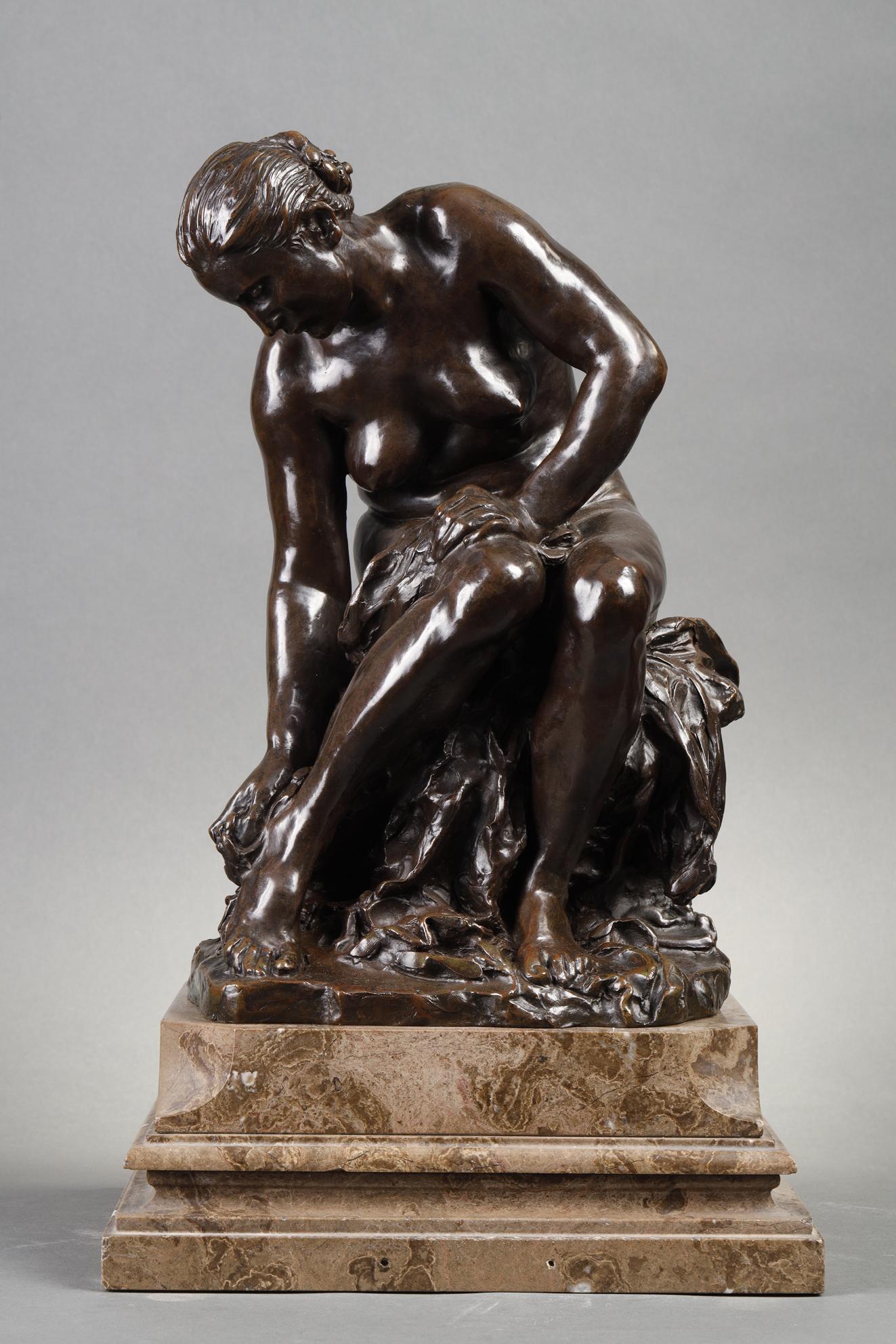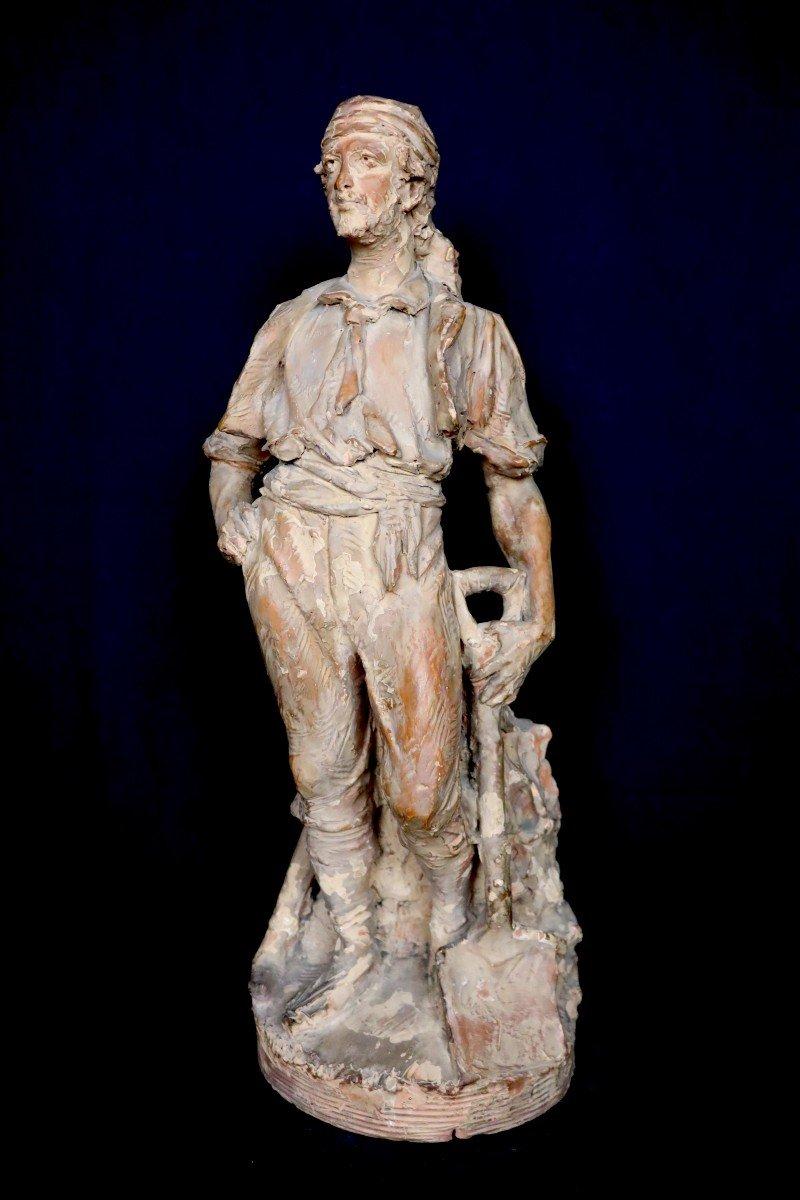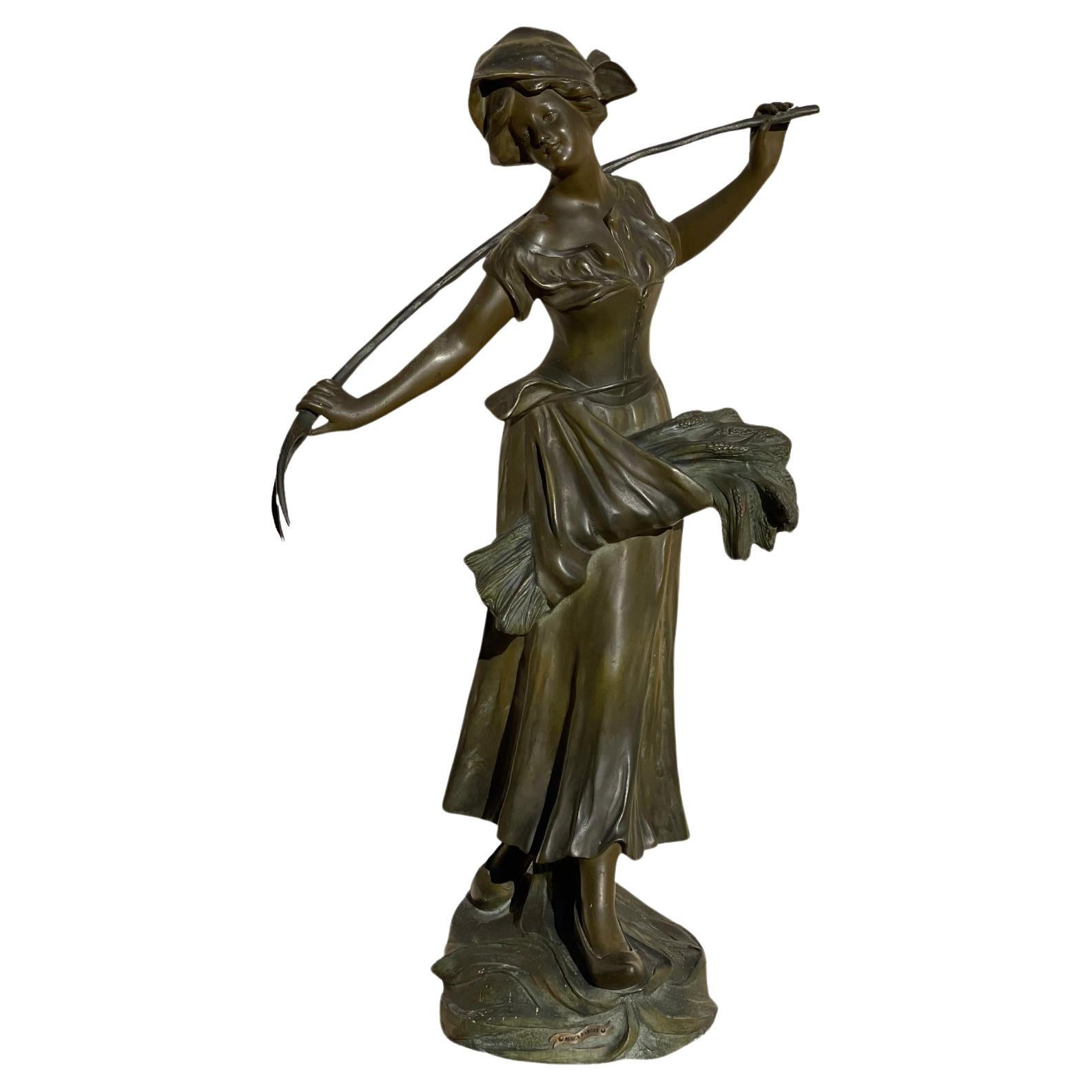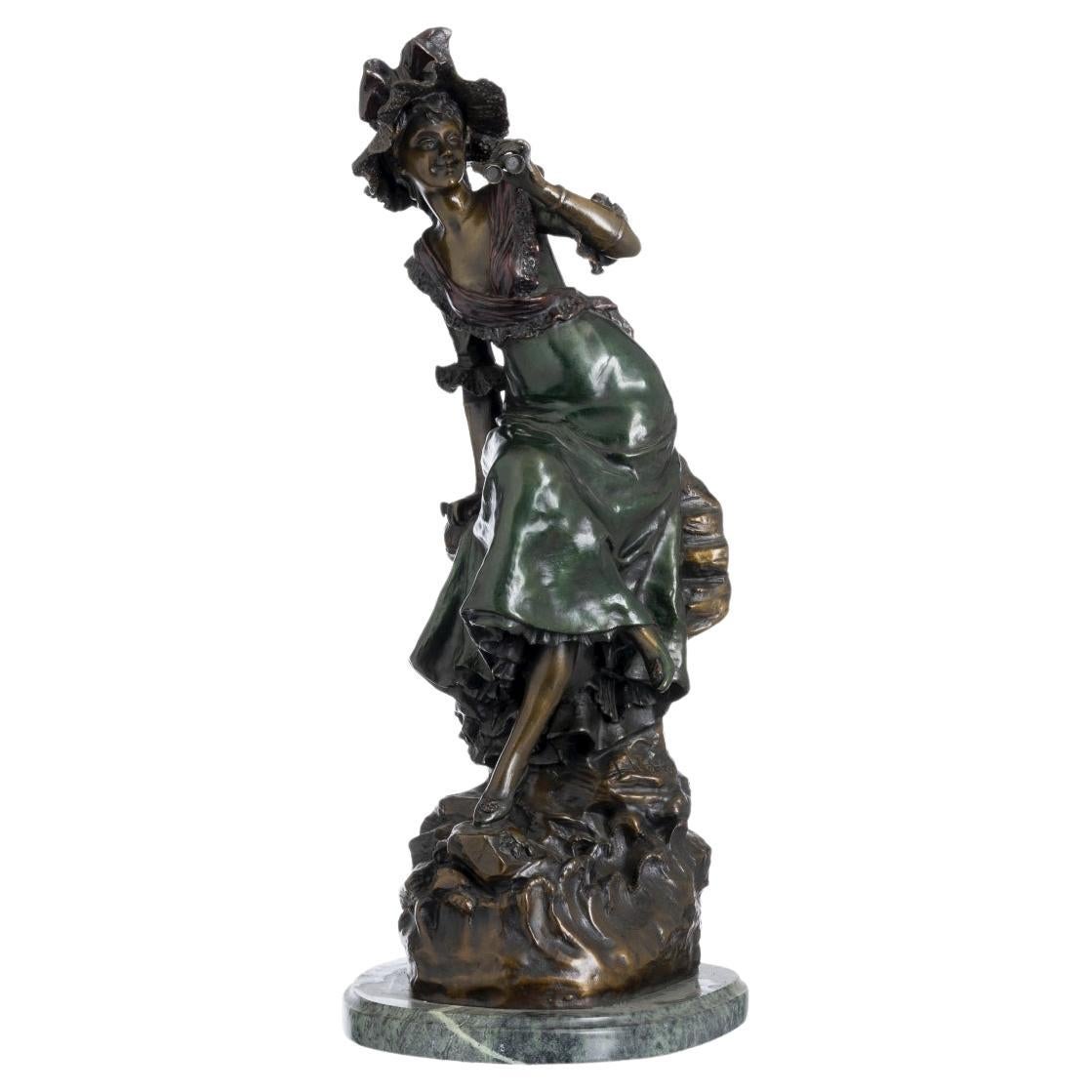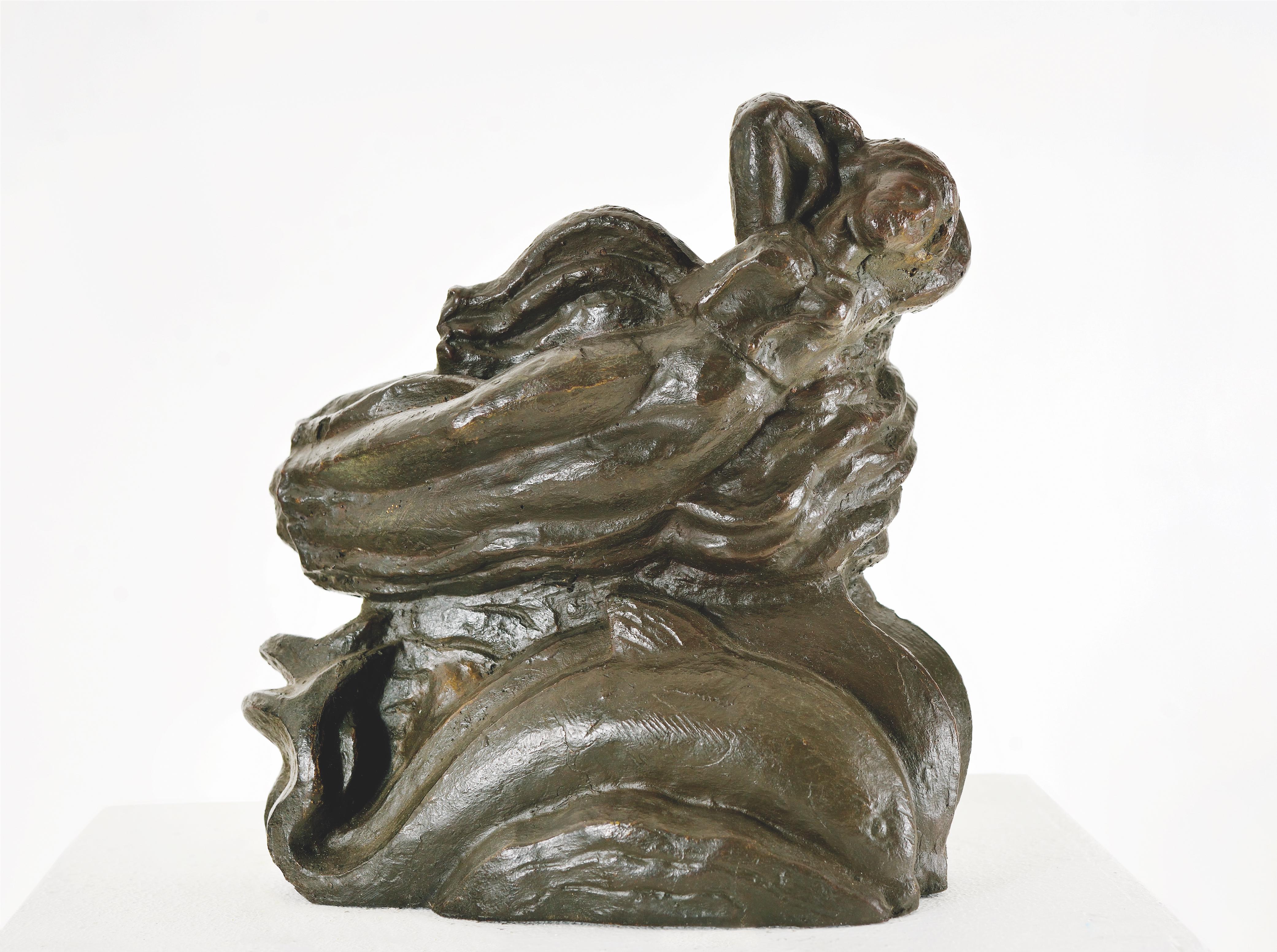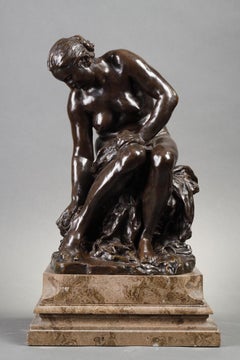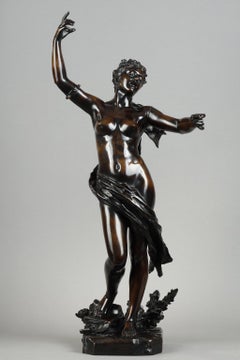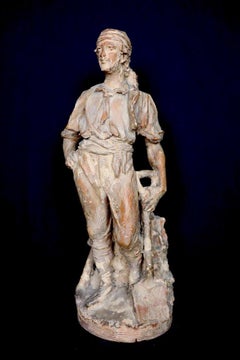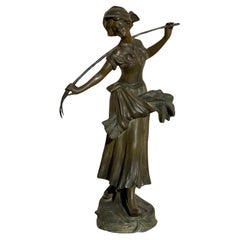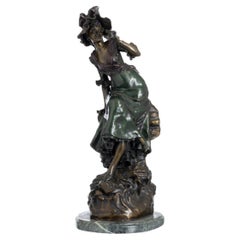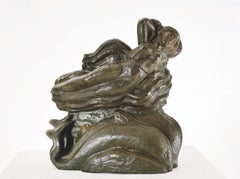Want more images or videos?
Request additional images or videos from the seller
1 of 19
François-Rupert CarabinLa Posadacirca 1901
circa 1901
$28,900.47
£21,382.74
€24,000
CA$39,960.05
A$43,871.15
CHF 22,887.67
MX$530,901.95
NOK 286,861.43
SEK 270,298.89
DKK 182,736.67
About the Item
La Posada
by François-Rupert CARABIN (1862-1932)
A bronze group with a silvered patina
Signed on the base "R. Carabin"
Old cast
Numbered "5"
France
circa 1901
height 24 cm
length 26,5 cm
depth 9 cm
A similar model is reproduced in "F.R. Carabin, 1862-1932», N. Lehni, E. Martin, Ed. Les Musées de la Ville de Strasbourg, 1993, p.79, n°48.
Biography :
François-Rupert Carabin (1862-1932) was a French sculptor, medalist, goldsmith, cabinetmaker and photographer from Alsace. Carabin emigrated to Paris with his parents following the Franco-German War of 1870. He did not return to Alsace before taking the post of Director of the School of Decorative Arts in Strasbourg in 1920 : his training as an artist was only made in Paris. This training began with an apprenticeship at Jouanin, an engraver on cameos, from 1878 to 1882, then, this profession falling gradually into disuse, Carabin worked as a sculptor in the Faubourg Saint-Antoine. He also followed the evening drawing classes of Perrin. Between 1883 and 1885 he attended dissection halls at the Faculty of Medicine to study anatomy. There, he met a mortuary masker, Jules Talrich, who pushed him for a time to practice this profession to obtain a source of additional income. Carabin frequented the cabarets and cafes of Montmartre ("The Black Cat", "The New Athens"...) and collaborated with Henri de Toulouse-Lautrec between 1892 and 1894 to produce works on the theme of brothels. The 1910s saw Carabin's success, but with the First World War, orders became scarce. In 1916, he had a violent haemorrhage which diminished him appreciably. Nevertheless, in order to support his family, he entered Dunlop as an advertising agent in 1916. The character retained his erotic inspiration since in 1919 he exhibited at the Salon of the National Society of Fine Arts a box with the theme of Sapphic love, entitled "Chaste look, leave me closed".
After the war, and with the return of Alsace to France, François-Rupert Carabin returned to Strasbourg and held the post of Director of the School of Decorative Arts in Strasbourg from 1920 until his death in 1932. During these thirteen years, he seemed to devote himself almost exclusively to teaching. His artistic production dried up considerably during the 1920s: he seemed to have abandoned the wood carving and the furniture pieces that made his reputation for making some wax statuettes, in line with the "Loïe Fuller" series. such as "The Racquet Player" or "The Javelin Thrower". It is known to him only two monumental works from 1920, the War Memorial of Saverne and that of Lutzelbourg.
His experience as a woodcarver made him aware of the problems of mass production of furniture copying the old styles, Carabin announced early his desire to "make the furniture unique, adapted to our needs, occupy the final place for which it would be designed and as ornamentation as subjects adapted to its destination. Carabin's concerns were in tune with the late nineteenth-century decorative arts revival movement, which sought to create a new style to end the pastiche of old styles. In line with the renovators of the decorative arts, Carabin was not limited to furniture and explored other forms of art, such as sculpture of bronze statuettes, with the series of "Loïe Fuller", and even ceramics. His task was not easy: the group of Independents, including Carabin who was one of the founders, refused to expose his bookcase made for Montandon, just because "the following year we could sent pots room! ". The year 1891 saw the decorative arts admitted to exhibit at the Salon des Beaux-Arts, which allowed Carabin to present his bookcase. In the 1890s, Carabin was part of the artist group, initially called The Five (then Society of Six), which in 1898 was transformed into an artistic movement, "Art in Everything", with the contribution of Tony Selmersheim, Henri Sauvage, Étienne Moreau-Nélaton, Jules Desbois, Paul Follot and René Guilleré. From 1893, he exhibited each year at the Salon of Free Aesthetics in Brussels and began to acquire some official recognition: the same year, he obtained the academic palms, followed by the Legion of Honor in 1903. Throughout his career, Carabin reflected on the question of the decorative arts, their teaching, the means to ensure their renewal in France. He openly criticized the division between "great art" and the decorative arts, relegated to the rank of industrial art during exhibitions.
- Creator:François-Rupert Carabin (1862 - 1932, French)
- Creation Year:circa 1901
- Dimensions:Height: 9.45 in (24 cm)Width: 10.44 in (26.5 cm)Depth: 3.55 in (9 cm)
- Medium:
- Movement & Style:
- Period:
- Condition:The silver patina is a bit tarnished.
- Gallery Location:PARIS, FR
- Reference Number:Seller: N.71821stDibs: LU2514216064382
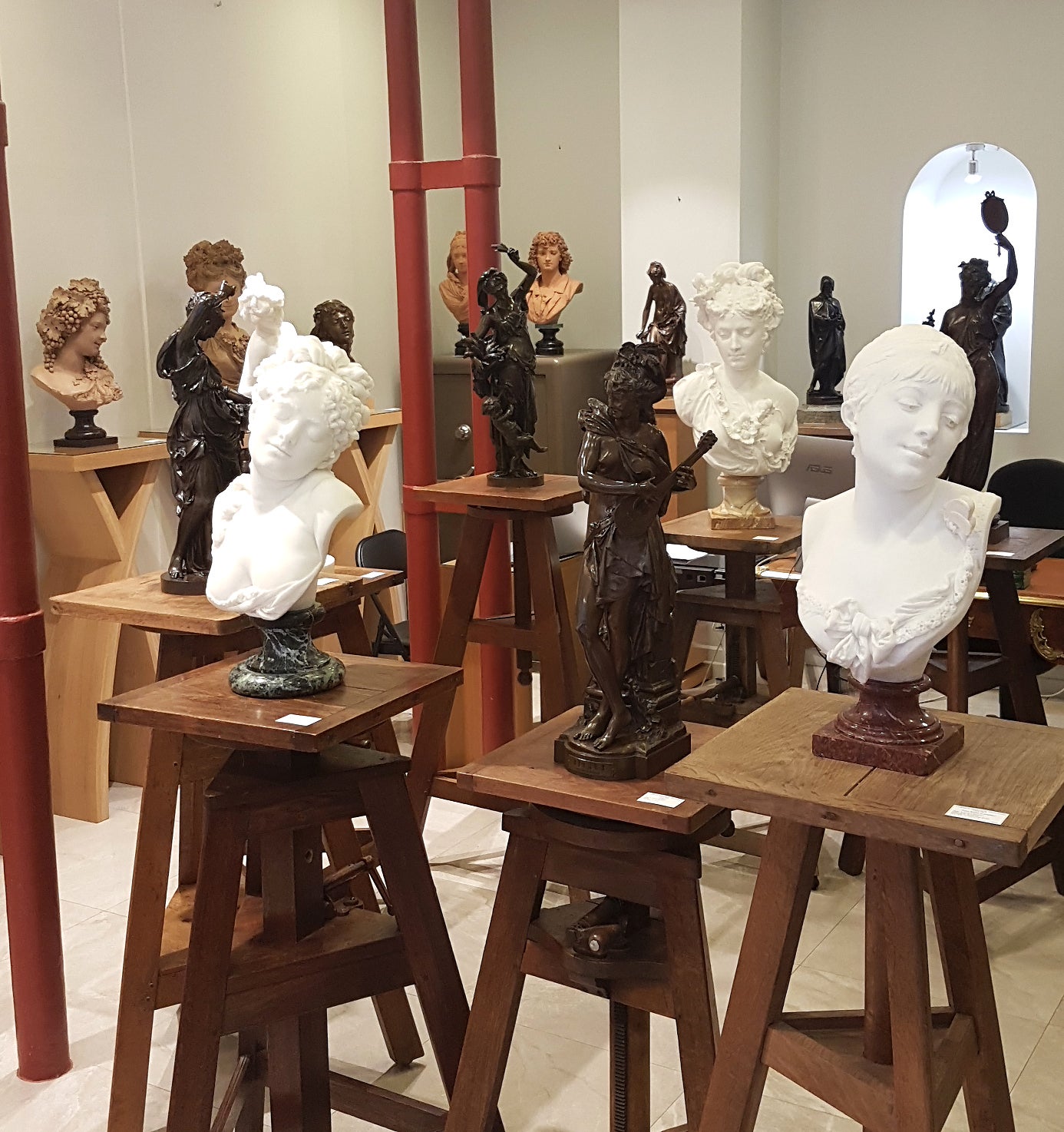
About the Seller
5.0
Recognized Seller
These prestigious sellers are industry leaders and represent the highest echelon for item quality and design.
Established in 1992
1stDibs seller since 2023
10 sales on 1stDibs
Typical response time: 9 hours
- ShippingRetrieving quote...Shipping from: PARIS, France
- Return Policy
Authenticity Guarantee
In the unlikely event there’s an issue with an item’s authenticity, contact us within 1 year for a full refund. DetailsMoney-Back Guarantee
If your item is not as described, is damaged in transit, or does not arrive, contact us within 7 days for a full refund. Details24-Hour Cancellation
You have a 24-hour grace period in which to reconsider your purchase, with no questions asked.Vetted Professional Sellers
Our world-class sellers must adhere to strict standards for service and quality, maintaining the integrity of our listings.Price-Match Guarantee
If you find that a seller listed the same item for a lower price elsewhere, we’ll match it.Trusted Global Delivery
Our best-in-class carrier network provides specialized shipping options worldwide, including custom delivery.More From This Seller
View AllSuzanne
By Aimé-Jules Dalou
Located in PARIS, FR
Bathing woman drying her right foot
also known as "Suzanne"
by Aimé-Jules DALOU (1838-1902)
A bronze sculpture with a nuanced dark brown patina
Signed on the base " Dalou "
A very...
Category
Early 20th Century French School Figurative Sculptures
Materials
Bronze
The Comedy
Located in PARIS, FR
Pierre-Marie POISSON (1876-1953)
The Comedy
Bronze sculpture with black patina
signed on the base "P. Poisson"
Cast by Valsuani (with the foundry stamp)
Raised on a stone base
Fra...
Category
1930s French School Figurative Sculptures
Materials
Bronze
The Song
By Félix Charpentier
Located in PARIS, FR
The Song
by Félix CHARPENTIER (1858-1924)
Bronze sculpture with a very nuanced dark brown patina
Signed on the base " Félix Charpentier "
Cast by "E. Colin & Cie Paris" (foundry ma...
Category
Early 20th Century French School Nude Sculptures
Materials
Bronze
Caress of Love
By Albert-Ernest Carrier-Belleuse
Located in PARIS, FR
"Caress of Love"
by Albert-Ernest CARRIER-BELLEUSE (1824-1887)
Bronze group sculpture with a nuanced dark brown patina
Signed on the back "A. Carrier-Belleuse"
Reposing on its orig...
Category
1870s French School Figurative Sculptures
Materials
Bronze
The Song
By Félix Charpentier
Located in PARIS, FR
"The Song" by Félix Charpentier (1858-1924)
A very fine bronze sculpture with nuanced dark brown patina
Signed "Fx. Charpentier"
Cast by "E. Colin & Cie Paris"
France
around 1900
he...
Category
Early 1900s Art Nouveau Figurative Sculptures
Materials
Bronze
Susanna
By Albert-Ernest Carrier-Belleuse
Located in PARIS, FR
Susanna
by Albert-Ernest Carrier-Belleuse (1824-1887)
Bronze sculpture with nuanced brown patina
signed to the side " A. Carrier "
old period cast
France
circa 1860
height 62 cm
...
Category
1860s French School Figurative Sculptures
Materials
Bronze
You May Also Like
Original Work By Josep Campeny y Santamaria
Located in ROUEN, FR
"Original Work By Josep Campeny y Santamaria"
Statue of Josep Campeny y Santamaria who represents a Catalan worker, recognizable by his shovel, his caraco vest and his scarf on his h...
Category
20th Century Figurative Sculptures
Materials
Terracotta
Francisco FLORA (1858-?) - Samac, Regaining Love
Located in Beaune, FR
Spelter sculpture with green patina representing a young peasant woman entitled "regain of love". Signed on the terrace "F. Flora". Good condition.
Dimensions
Height 69cm
Diameter 20cm
Category
Antique 19th Century French Figurative Sculptures
Materials
Metal
Louis Hottot (1834-1905)
By Louis Hottot
Located in Porto, PT
"Girl with Binoculars". Bronze sculpture on a marble base. Signed. Height: 63 cm.
Category
Antique 19th Century French Figurative Sculptures
Materials
Bronze
Maqueta las toninas
Located in Miami, FL
Maqueta las Toninas, 1944
BMY-022, 1970
Edition 1/25
Bronze
22 x 22 x 10 cm
8.6 x 8.6 x 3.9 in
ABOUT THE ARTIST
Narvaez was born in Porlamar, Venezuela, in 1905; he was the fifth son of eleven siblings; his parents were Jose Lorenzo Narvaez and Vicenta Rivera. Don José Lorenzo, a multifaceted and creative man, sowed the seed of creativity in his son. “My father did not fit in with his fantasies of cabinetmaker, bricklayer, master builder, and self-taught architect.”1 From an early age, Francis was led to the artistic activity, he traced, carved, made replicas of the furniture and the saints restored by his father.
In 1920 he obtained his first professional assignment, a San Rafael for the Church of Carupano, and, in 1922, his father authorized him to travel to Caracas to pursue his studies as an artist. He studied at the atelier of Marcos Castillo, at of the Angel Cabre y Magriña and at the Academy of Fine Arts in Caracas, where he was introduced to the painters and intellectuals of the time.
In 1928 he presented his first solo exhibition at the Club Venezuela. With the money raised from the sale of the works and the support of Monsignor Sosa, and the Ministers Centeno Grau and Arcaya, he studied in Paris on a scholarship. Once there, he enrolled at the Académie Julian, where Tito Salas, Cristóbal Rojas and Arturo Michelena had also studied. It was in Paris where, unable to work in wood, he turned to stone carving. “In Paris, I didn’t have wood, so I carved a lot in stone (…), when there were demolitions I purchased chunks of stone, I would take them to the workshop and carve them.”2
His first attempts at volumetric sculptures and painting in plain colours, linked to the thematic of American miscegenation and Creole reality, can be traced back to that first trip to Paris. During his stay in the French city, Arturo Uslar Pietri, Alfredo Boulton, and Finita Vallenilla supported the artist both financially and logistically, and in February of 1930, the trio of friends arranged another exhibition for him at the Club Venezuela. Narvaez describes his exhibition as follows: “(…) in it I feel that the sculptural work is more my own, done with more assurance, a response to my pursuit of large planes, stylisation and synthesis.”3 By then, as Boulton himself noted in his book about the artist, Narvaez departed from most of the artistic traditions that prevailed by that time in Venezuela.
In 1931 he returned to Caracas and established his atelier at the Barrio Obrero in Catia. The atelier became the hub of the intellectual life of the time. “In those years, the atelier of Francisco Narvaez was the hub of the greatest Venezuelan hope. Nothing comparable to it can be found either before or since.”4
From that year onwards, exhibitions, projects, trips, and awards we multiplied. He was awarded the President of the Republic of Venezuela Prize, the National Sculpture Prize of the 1st Official Venezuelan Art Salon, and the John Boulton Prize of the 3rd Annual Venezuelan Art Salon; for the Military Academy, he produced a spectacular relief entitled La Patria.
In 1945, commissioned by the architect Carlos Raúl Villanueva, he produced two groups of sculptures known as Las Toninas, both located in the O’Leary Square. There, as he himself states, he incorporates some baroque patterns into the figures to the source itself: “It is a work of balance between the decorative requirements and the sculpture of planes and angles.”5
In 1948 he was awarded the National Painting Prize. In the same year, he was called upon by the architect Carlos Raul Villanueva to participate in the project for the arts integration in the Universidad Central de Venezuela. Francisco Narvaez’s public output continued with works such as the statue of Fermín Toro, La Educacion, La Ciencia, three murals (produced by María Luisa Tovar) for the Instituto de Medicina Experimental, El Cristo; el Atleta, the equestrian statue of General Rafael Urdaneta.
In 1953 he was appointed Director of the School of Plastic and Applied Arts, and in July of the same year, he exhibited “Francisco Narvaez, Maderas, Piedras y Bronces” (Francisco Narvaez, Woods, Stones and Bronzes) at the Museum of Fine Arts.
Narvaez is, unquestionably, one of the great Venezuelan sculptors, his work goes through various stages and interests; as the art world evolves, the artist does not remain in his initial scopes of work. His creations are not imposed by the prevailing trends or fashion but do evolve by experimenting with new materials and interests.
When one peruses the artist’s lengthy list of exhibitions, commissions, and awards, it is worth remembering the Narvaez who embark on his career as a child and who, overcoming obstacles, knew how to make the most of his curiosity. He did not settle for living off his successes. He did not remain stagnant as many creators of his environment did. Narvaez managed to understand the changes in the history of art around him. We must not overlook the fact that Francisco Narvaez is an artist amid all the changes occurring in the art world. He moves from the classics to the great transformations in the art world. It is the Europe of Picasso, Braque, Arp. He observes, he is aware of what is happening in the centres of the world of art, but between his craft and his sensitivity, the result is NARVAEZ, his stamp, and his identity.
Francisco Narvaez comes from tradition, and his first stage is linked to the classics, to the exploration of his heritage, but always with his very own language. Throughout his prolific career, he knew how to remain true to himself, without disregarding the influences of his surroundings or his artistic interests: his ability as a sculptor, his selection of materials, whether they were wood, stone or bronze; his choice of the subject of his work…His mastery and great craftsmanship are a constant that over time have made him a leading player in the history of contemporary Venezuelan and world art.
From his beginnings, no subject was foreign to him. His paintings, drawings, aquarelles, and sketches are testimony to his prolific output. Among his themes are portraits, our traditions, still lifes, and landscapes. Narvaez is an artist who represents his time. Later, he evolved towards purer and simpler forms, abandoning figurative art for short periods.
In 1956 he declared to the newspaper El Nacional: “Every day I am freeing myself, it is a soul that frees itself from the ephemeral wrappings of the circumstantial always, as well as from the inevitable weight of the anecdote. This second stage of my work is remarkably close to abstractionism, even if there are still certain figures or figurations in the sculptures that I will shortly be showing. However, pure, and absolute abstractionism, it will treat the form itself as the sole reason for its existence on the plane of artistic excellence.”6
The artistic development was his professional life. Each period of his life as an artist, he went one step further, searching, solving, seeing plenty of things and understanding how diverse expressions were transforming themselves. His hands followed his gaze and his mind, always inquisitive. He added movement to the volumes.
Arturo Uslar Pietri, “Formas Nuevas”, Cromotip editions, 1956 “Francisco Narvaez is a path: the path that Venezuelan sculpture...
Category
1940s Baroque Figurative Sculptures
Materials
Bronze
Love Song
Located in Roma, RM
Costantino Barbella (Chieti 1852 - Rome 1925), Love Song
Bronze sculpture 41 x 35 x 21 cm signed at bottom, on black marble base.
Provenance: Private Collection, Rome.
Category
Late 19th Century Other Art Style Figurative Sculptures
Materials
Bronze
Eutrope Bouret (1833-1906) Psyché
By Eutrope Bouret
Located in Berlin, DE
Eutrope Bouret Bronze
Spyche
Eutrope Bouret (French, 1833-1906)
Late 19th century.
Signed on the base
Bouret (French, 1833–1906) was an important 19...
Category
19th Century Jugendstil Figurative Sculptures
Materials
Bronze
